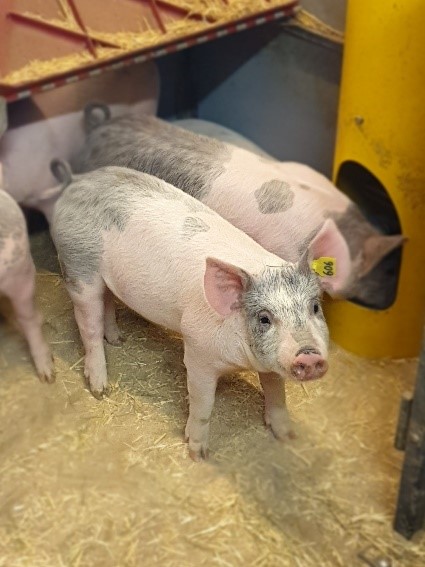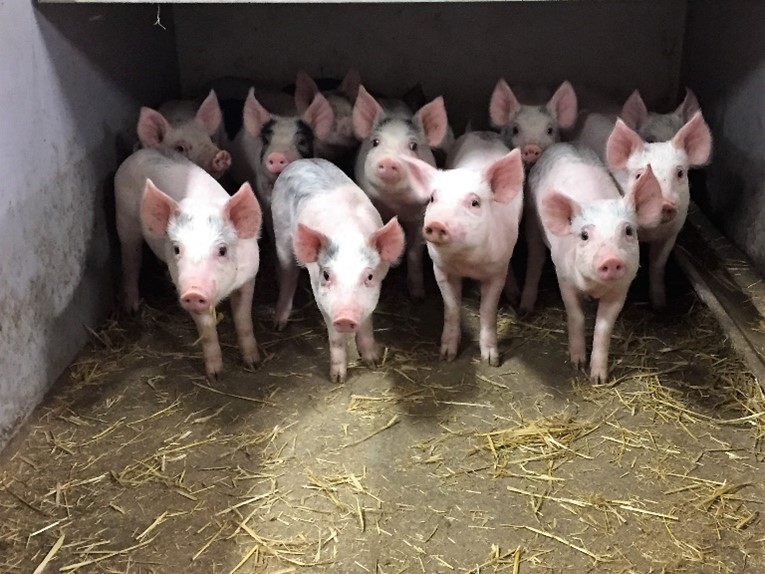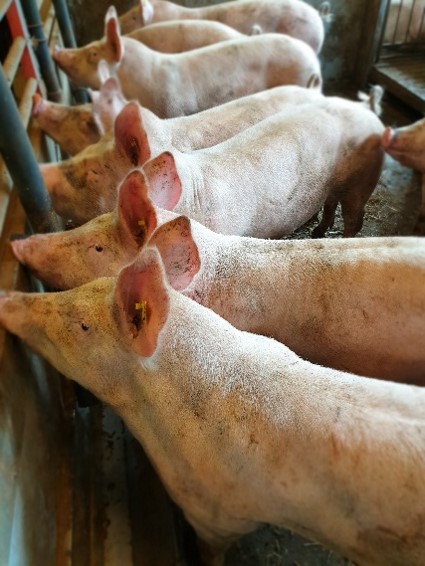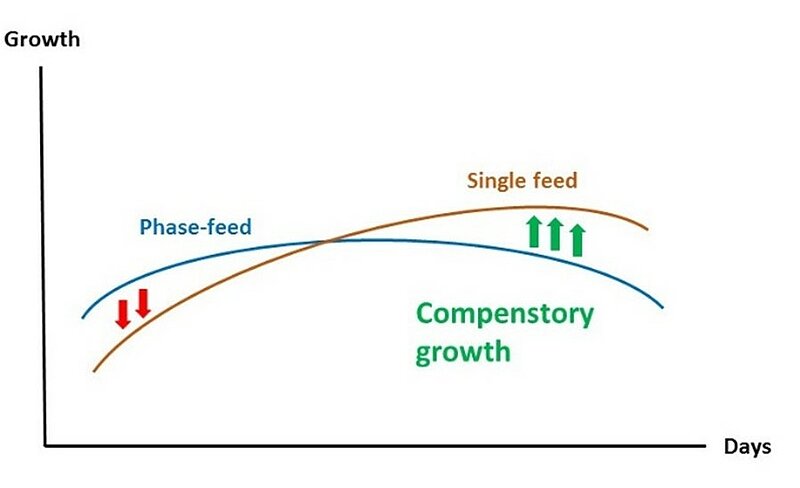Single-phase feeding and compensatory growth in growing and finishing pigs
Problem
Meeting growing pigs’ nutrient requirements with on-farm-produced cereals and protein feed ingredients can be hard. To overcome the risk of undersupplying pigs with amino acids, diets are formulated with higher contents of protein than recommended. With 100 % organic feedstuffs, it is difficult to match the amino acid requirement without a very high level of protein. This can decrease the health and welfare of weaners and increase nitrogen losses.
Solution
A single-phase feeding strategy and utilising pigs’ capacity for compensatory growth (Figure 2) can lessen the need for diets with high protein and amino acid content in the early stage of the growing phase. It can promote the use of locally produced protein feed resources in diets to organic pigs.
Benefits
Single-phase feeding of pigs followed by growth compensation might reduce nitrogen emissions, as it excludes the need for a high protein and amino acid content in the diet in the early stages of growth. It enables efficient use of locally produced protein feed resources and can reduce soya intake by pig and simplify feed manufacturing, feed handling and diet formulation at the farm level. This practice can reduce the cost of the feed for the weaners.
Applicability box
Geographical coverage
Global
Application time
All year round
Required time
Growing/finishing period
Period of impact
All year round
Equipment
Feed ration planning
Best in
Growing/finishing period
Practical Recommendations
- Limit the supply of essential amino acids during early growth and utilise the pigs’ capacity to fully compensate for the restriction by increased protein retention and faster growth during later growth phases.
- Crude protein and lysine contents can be substantially reduced, below common standards (i.e. crude protein to 16.5% and digestible lysine between 0.70-0.80 g standardised ileal digestible (SID) lysine/MJ NE), in well-balanced diets.
- A reduction in crude protein content, from 15.5 to 14.5 g SID/g SID lysine can lower the nitrogen output by approximately 10%.
- Formulate diets on a digestible amino acid basis rather than on a total amino acid or crude protein basis.
- High-quality protein feed ingredients such as faba beans, peas, oil seed-, dairy- and cereal-based by-products, aquatic resources, etc., or a combination of them, can be used.
- At the pig level, this practice can reduce soya bean cake utilisation (14%) and increase pea utilisation (22%).
- Careful follow-up of the pigs' feed consumption, growth and health status is recommended.
Further information
Reading
- Presto Åkerfeldt, M. and L. Göransson (2019). Effects of using locally produced protein feed ingredients in low protein diets to single-phase-fed growing-finishing pigs. Acta Agriculturae Scandinavica, Section A - Animal Science, 68 (3), 134-141. https://doi.org/10.1080/09064702.2019.1657175.
- Presto Åkerfeldt, M. and J.E. Lindberg, L. Göransson, K. Andersson (2019). Effects of reducing dietary content of crude protein and indispensable amino acids on performance and carcass traits of single-phase- and 2-phase-fed growing-finishing pigs. Livestock Science 224, 96-101. https://doi.org/10.1016/j.livsci.2019.04.014.
- Check the Organic Farm Knowledge platform for more practical recommendations on pigs as well as feeding and ration planning.
About this practice abstract and OK-Net EcoFeed
Publishers:Department of Animal Nutrition and Management,
SE750 07Uppsala,
Phone ,
,
www.slu.seResearch Institute of Organic Agriculture (FiBL),
CH5070Frick,
Phone +41 62 865 72 72,
info.suisse@fibl.org,
www.fibl.orgIFOAM Organics Europe,
BE1000Brussels,
Phone +32 2 280 12 23,
www.organicseurope.bio,
www.organicseurope.bio
Review: Barbara Früh, FiBL, Antoine Roinsard, ITAB
Contact: magdalena.akerfeldt@slu.se
Permalink: https://organic-farmknowledge.org/tool/37512
https://orgprints.org/view/projects/OKNetEcoFeed.html
This practice abstract was elaborated in the Organic Knowledge Network on Monogastric Animal Feed project. The project is running from January 2018 to December 2020. The overall aim of OKNet EcoFeed is to help farmers, breeders and the organic feed processing industry in achieving the goal of 100% use of organic and regional feed for monogastrics.
Project website: https://ok-net-ecofeed.eu/
IFOAM Organics Europe (project coordinator), BE; Aarhus University (ICROFS), DK; Organic Research Centre (ORC), UK; Institut Technique de l'Agriculture Biologique (ITAB), FR; Research Institute of Organic Agriculture (FiBL), CH; Bioland, DE; Associazione Italiana perl'Agricoltura Biologica (AIAB), IT; Donau Soja DS, AT; Swedish University of Agricultural Sciences, SE; ECOVALIA, ES; Soil Association, UK.
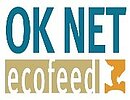


This project has received funding from the European Union’s Horizon 2020 research and innovation programme under grant agreement No 773911. This communication only reflects the author’s view. The Research Executive Agency is not responsible for any use that may be made of the information provided. The authors and editors do not assume responsibility or liability for any possible factual inaccuracies or damage resulting from the application of the recommendations in this practice abstract
